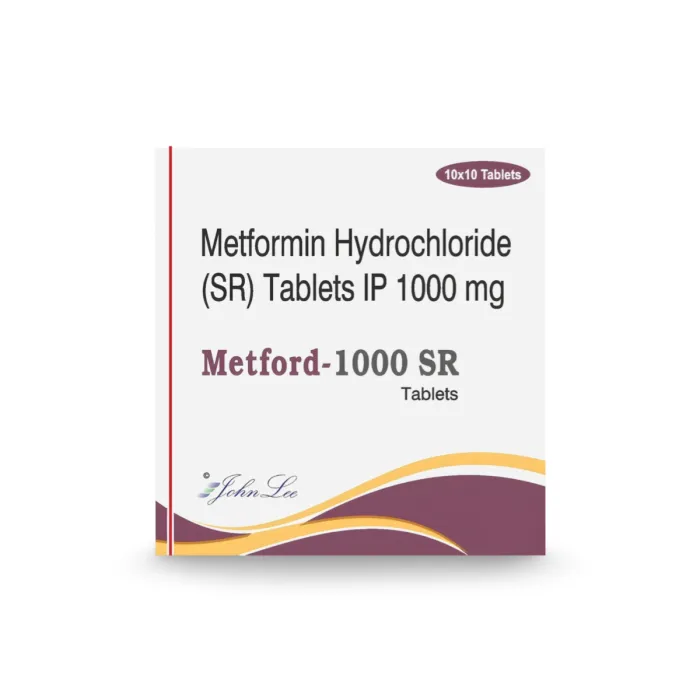
Metford 1000 Mg SR Tablet
| Pack Size | Price | Qty | Unit Price |
|---|---|---|---|
| 50 Tablet/s | $15.50 | $0.31 | |
| 100 Tablet/s | $29.00 | $0.29 | |
| 150 Tablet/s | $40.50 | $0.27 |
What is Metford 1000 SR
Metford 1000 SR is a potent oral anti-diabetic drug primarily indicated for managing type 2 Diabetes mellitus in adults when lower doses of Metformin or other oral anti-diabetic agents prove insufficient. The active component is Metformin Hydrochloride, delivered in a 1000 mg sustained-release format, classified under the biguanide category of medications.
Johnlee Pharmaceuticals Pvt Ltd is the esteemed producer of Metford tablets. This medication reduces hepatic glucose production, lowers intestinal glucose absorption, and enhances insulin sensitivity. Common Metford side effects may include gastrointestinal disturbances such as nausea, diarrhea, and abdominal pain.
Although rare, serious side effects like lactic acidosis can occur, particularly in individuals with renal impairment, liver disease, or heart failure. Metford should be stored at temperatures below 30°C, shielded from light and moisture. Before initiating treatment, patients are advised to disclose all medical conditions, particularly those related to kidney function, liver health, cardiovascular issues, and any current medications.
What are the benefits of Metford 1000 SR
Metford 1000 SR contains a high-dose sustained-release formulation of Metformin hydrochloride, which provides extended blood glucose control throughout the day. It works by lowering insulin resistance and improving glucose utilization in peripheral tissues while decreasing hepatic glucose production and intestinal glucose absorption.
Key benefits include:
- Once-daily dosing convenience for better patient compliance.
- Extended 24-hour glycemic control with fewer blood sugar fluctuations.
- Reduced risk of Hypoglycemia compared to sulfonylureas.
- Cardiovascular protective effects are independent of glycemic control.
- Weight-neutral or modest weight loss effect, beneficial for overweight patients.
How to take Metford 1000 SR
Metford 1000 SR is a prescription medication that should be taken as per your doctor's instructions. Here are the general guidelines:
- Take Metford 1000 SR once daily with dinner or the evening meal.
- Swallow the tablet whole with a full glass of water. Do not crush, chew, or break it.
- Take consistently with food to minimize gastrointestinal side effects.
- Do not exceed the prescribed dosage of Metford 1000 SR.
Strengths and substitutes
The strengths and substitutes available for Metford are:
|
$1.2/10 Tablets |
|
| $1.5/10 Tablets |
What are the side effects of Metford 1000 SR
Metford 1000 SR is generally well-tolerated. However, it may cause side effects, including:
- Gastrointestinal disturbances (nausea, vomiting, diarrhea, bloating)
- Metallic taste in the mouth
- Loss of appetite
- Vitamin B12 deficiency with long-term use
These effects generally subside on their own as your body adjusts to the medication. Taking Metford with meals can significantly reduce gastrointestinal side effects. Starting with a lower dose and gradually increasing to 1000 mg may improve tolerability.
Safety Advice
Metford 1000 SR is contraindicated in patients with severe liver disease, as impaired hepatic function may increase the risk of lactic acidosis. Regular liver function tests are advised before and during treatment. Patients with elevated liver enzymes or active liver disease should seek alternative treatments.
Metformin is primarily eliminated through the kidneys. Metford 1000 Mg SR is contraindicated in patients with moderate to severe kidney impairment. Regular kidney function monitoring is essential. Based on kidney function, dose adjustment or alternative medication may be necessary.
Insulin is typically the preferred method for controlling blood glucose during pregnancy. Limited data exists regarding Metford 1000 SR in pregnancy. If used, benefits should outweigh potential risks. Small amounts of Metformin pass into breast milk but are generally considered safe for the infant. Consult your healthcare provider for personalized guidance.
Alcohol consumption should be strictly avoided as it increases the risk of lactic acidosis. Metformin should be temporarily discontinued before radiological studies using iodinated contrast agents. Certain medications, including Cimetidine, Furosemide, Nifedipine, and some antibiotics, may interact with Metformin. High-carbohydrate diets can also challenge blood glucose control.
FAQs
Can Metford 1000 SR be taken on an empty stomach?
No, Metford 1000 should always be taken with food, preferably with dinner or the evening meal. Taking it with food reduces gastrointestinal side effects and improves tolerance. Always follow the doctor’s instructions.
Is Metford 1000 SR suitable for type 1 Diabetes?
No, the Metford 1000 tablet is not appropriate for type 1 Diabetes treatment. It works by improving insulin sensitivity, which requires some insulin production. Type 1 diabetics need insulin therapy.
How soon will I see results with Metford 1000 SR?
You may notice improved blood glucose levels within 1-2 weeks, but the full therapeutic benefit typically takes 4-6 weeks. Regular monitoring is essential to track progress and adjust treatment if needed.
Can I switch directly from regular Metformin to Metford 1000 Mg SR?
No, Switching should be done under medical supervision. Generally, patients can switch directly if well-tolerated, but sometimes, a gradual transition helps minimize side effects, especially with this high-strength formulation.
What is the difference between Metford 1000 Mg SR and regular Metformin?
Metford 1000 Mg SR provides sustained release of medication over 24 hours, allowing once-daily dosing and fewer GI side effects compared to immediate-release Metformin tablets, which require multiple daily doses.
{{title}}
{{{detail}}}
{{#adminComment}}